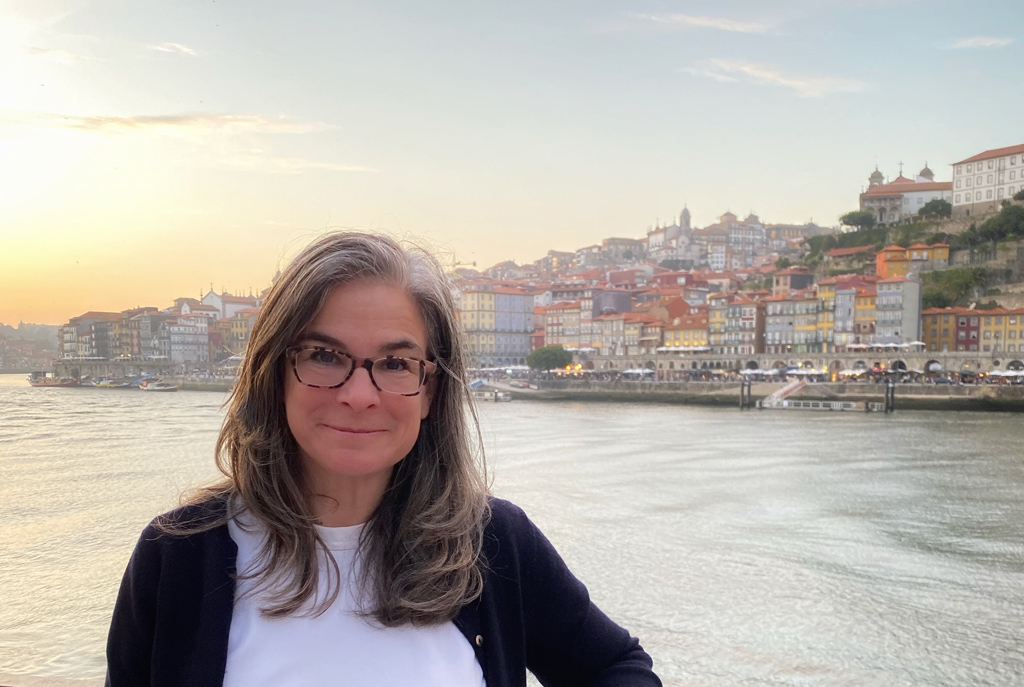Going the Distance: Scott Mayerowitz ’00 on a Career in Travel Journalism

Scott Mayerowitz ’00 spent much of 2019 soaring to great heights.
As the executive editorial director at The Points Guy—a points-and-miles blog turned lifestyle brand dedicated to helping readers get the most value out of their travel experiences—Mayerowitz found himself on 49 flight segments over the course of the year, with an average flight length of 1,257 miles. All told, he flew 61,580 miles last year (far enough to travel around the world twice, and then some).
It’s just par for the course (and only one portion of Mayerowitz’s job) at The Points Guy. He’s quick to point out that his mileage isn’t exactly outrageous.
“I have people on my staff who flew 250,000 miles in the past year,” he said.
Still, “globe-trotting journalist” seems an appropriate—and enviable—title for Mayerowitz, who came to The Points Guy after having worked various business, travel, and politics beats for the Associated Press, ABC News, and a newspaper. He now oversees all of The Points Guy’s editorial coverage, produced by about 40 writers and editors based in the US and UK.
Mayerowitz recently offered a first-class peek behind the curtain of his industry.
Catch us up on what you’ve been doing since Wesleyan. Did you follow a straight path to your current role as a travel journalist, or did this direction emerge over time?
Scott Mayerowitz: Less of a path, actually. I think that’s where Wesleyan has come in with the liberal arts education—letting me pivot throughout my career. At Wesleyan, I was a political science major. I was editor-in-chief of The Argus my second semester of sophomore year. I was interested in politics; I was senior class president. I was involved in admissions as an interviewer, and I was doing a lot in the community, all while interested in storytelling. In my senior year, I got an internship at the Hartford Courant. After graduation, I worked at the Providence Journal, covering small-town local politics and whatever news of the day there was. Eventually, I worked my way up to be statehouse reporter.
Then I pivoted and got a job at ABC News covering Wall Street. I was always interested in travel, and I did a lot of travel reporting on the side. Eventually, I got to take over the network’s online travel coverage. Next I switched to the Associated Press, and had what was my first real dream job, covering the airline industry. I basically got to fly around the world doing big, in-depth pieces on aviation and how that impacted our lives. That expanded into the hotel industry, and even car rentals. I got a great understanding of the intersection between what travelers want and what businesses want. It was a job where I’d sometimes be in airports interviewing passengers one day, and at airline headquarters interviewing CEOs about the future of air travel the next.
Then I became deputy business editor [at the Associated Press]. My whole career, I’ve switched back and forth between politics, business, and travel. They’re different areas but they actually do intersect often. And I think those intersections lead to the best stories.
What appeals to you about journalism?
SM: What I really love about journalism is you’re constantly learning new things every day. Your job as a reporter is to go into the field, find out what’s going on, and find a way to articulate that to the general public, in a simple, accessible way.
After the AP, you accepted your current position. What makes The Points Guy so relevant?
SM: It’s a unique time in media and journalism. It’s very hard to get honest opinions on hotels or flights. You either have these highly polished reviews that often [are the result of] journalists’ working with travel providers, or you have an onslaught of reviews from places like TripAdvisor, and it’s very hard to sort through that mess. Very much as Pauline Frommer said, travelers are really looking for a trusted source out there.
At The Points Guy, we have a team of about 100 people, including about 40 on editorial, both in the US and the UK. And I think there’s one thing that we offer that others don’t: We pay for our flights, hotels, and travel anonymously. There are occasional times when we do fly and work with travel partners, but those are not for reviews.
What’s been the most rewarding travel experience you’ve had?
SM: [The Points Guy colleagues and I] took an amazing trip in October to Cape Town, South Africa, to participate in a conference led by PeaceJam, [a nonprofit that The Points Guy has been working with since 2014]. PeaceJam brings Nobel Peace laureates to [speak to and inspire young leaders in] Ghana, East Timor, South Africa, Liberia, and Guatemala.
I was part of a workshop where we talked about what you would need to start a business that would help you give back to your community. We discussed very basic business school principles: Who is your customer; what are their needs? What are the challenges? It was a very short session, but one that got some of the kids thinking in a different way. And you could see through their questions how excited they were and how much they wanted to give back to their communities.
Are there any downsides of working in travel?
SM: Unfortunately, [travel can make you feel like you’re] in a bubble, particularly if you’re one of those travelers constantly flying around the world. You don’t get a chance to experience the place you are in.
How can someone get a little closer to having an authentic local experience while traveling?
SM: I think the two best things that a traveler can do are: Speak to random strangers, people you just meet along the way, and ask them for advice; and walking. The more you walk, the more life slows down for you. When you fly across the country, you get a sense of where the mountains, the rivers, the cornfields are, but that’s about it. When you drive, you get a sense of that a little bit more. When you bike, you get a sense of a county. When you walk, you really get a sense of a neighborhood.
When my wife and I spent three nights in Tokyo, we had a checklist of things that we wanted to do. But we made sure that between activities, we also found two or three places to walk. It took an extra hour or two each day, but it was good exercise and it gave us just a little bit of a taste of the neighborhoods.
What travel trends will we see in the new decade?
SM: I think US travelers are finally going to be much more aware and conscious of their environmental footprints. The hotels you stay at, the waste you create—it adds up and is something we’ve been very aware of. At the Points Guy, we made the decision to offset all of our carbon for the year. We bought carbon offsets. It’s not the perfect solution, and we know people are still going to travel and still believe that there should be frequent travel, but people need to do it in a responsible way.


